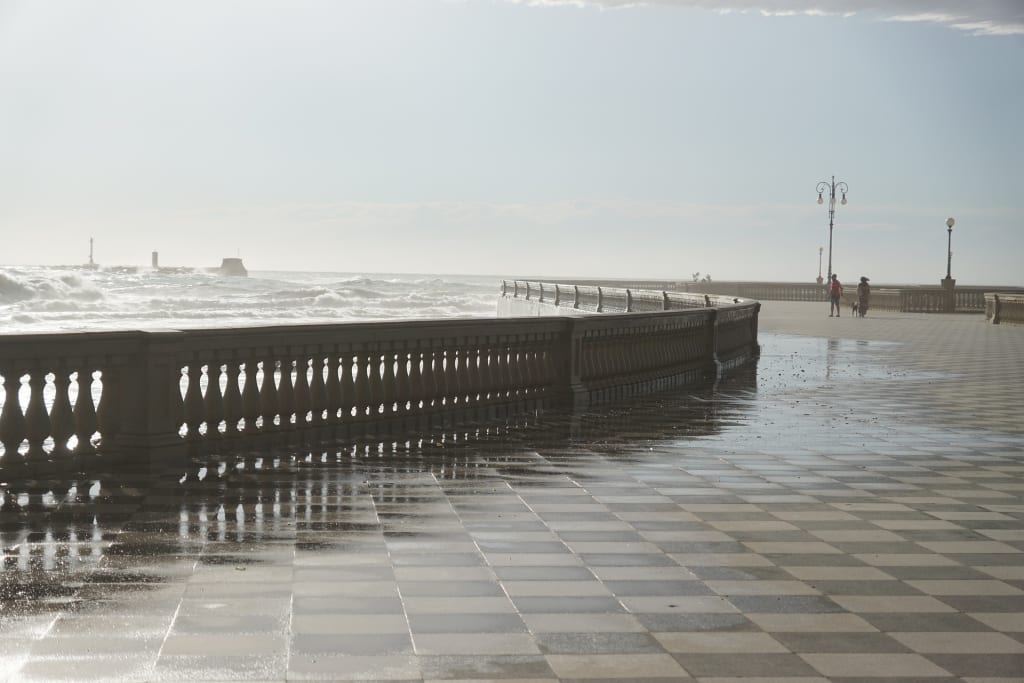I versi livornesi di Giorgio Caproni
On poetry

“Livorno, when she passed by,
she smelled of air and boats “
Giorgio Caproni (1912–1990) was born in Livorno and there he set his most beautiful poems, those dedicated to his mother, Anna Picchi, Annina, called “Versi Livornesi”, in the collection “The seed of crying” of 1959.
In 1922 he moved to Genoa, and then to Rome. He was a salesman, an employee and an elementary teacher. His first works were rejected by the publishers, he was told to “be patient”, he was made to understand that poetry was not his thing. But he insisted, in addition to poems, he wrote literary criticism, reviews and translated from the French “The Time Regained” by Proust, “The Flowers of Evil” by Baudelaire, “Bel-ami” by Maupassant, and Celine and Apollinaire.
Even when literary fortune smiles at him and he wins numerous important prizes, he will always be secluded and away from the literary salons, closed in his existential pain, the result of numerous traumas, such as the death of his first girlfriend from septicemia and the calamities of war.
He also writes essays and narrative works but his highest output is concentrated in poetry. His most famous collections are “Cronistoria” (43), “The stanzas of the funicular”, (52),” The passage of Aeneas”, (56), “The seed of crying” (59)
There are three tempos in Caproni’s poetry, the first is Macchiaiolish and Carduccish, it contains a trace of Tuscan primitives and certain Cavalcantian and Stilnovistic ways, lacking, however, spiritual idealization. The following poem is an example:
PEOPLE POINTED AT HER
There was not in all of Livorno
another better than her
in white, or hemstitch.
People pointed at her
seeing her, and if she turned around
also to say hello,
her chest swelled
shy, and it lowered again,
quiet in its tumult
like the sigh of the sea.
She was an outspoken little person
and a little proud (a little
lean), but sweet and lively
in her outbursts; and free
as she was of vainglory
but not of stubbornness, she was popular
in Livorno
how I would like that around
you went, song:
you that seem written for fun
but you are with crying: and with fire.
Then there is a lyrical and neoclassical flare in “Cronistoria” and in “The passage of Aeneas” and finally a progressive stripping and loss of lyricism, as if, over the years, the word was now a burden.
“The noise of the word, at a certain point, began to bother me terribly”.
The research is aimed at simplification, the verse mixes courtly and prosaic together, it oscillates between sung and spoken (and in this it recalls the Ligurian line, in particular Sbarbaro.) It still refers to a pre-hermetic vein, to the descriptive musicality of Saba and to the Pascolian metric. Consciously anti-nineteenth century, Caproni rejects purely syntactic and conceptual games. He wants a poem made up of glasses, strings, things of everyday life, his impressionism avoids idyll and elegiac complacency, even the syntax is reduced to the essential while the objects take shape.
The architecture and the control of the metric contrast with the vitalistic urgency, often expressed by the initial exclamations, the period does not end in the verse but overflows into the enjambement, the versifying becomes broken, reflecting the soul of the poet who tries to grasp an elusive reality. Caproni recalls in this Virginia Woolf, her sense of growing dissatisfaction, her distrust in the possibility that the word can truly represent things.
“No one has ever managed to say
What is, in its essence, a rose. “
He hates logorrhea, long lines. “The ideal”, he says, “would be to get to write a single word, or rather, to go beyond the word”. For him, the word has a negative value, because it limits, it is a simulation of reality. The word is itself an object and, assuming that reality exists, one cannot know an object with another object.
Caproni uses rhyme, alliteration, assonance, anaphora (repetition of words or expressions), prosopopoeia (when animals, objects, the dead speak) and punctuation with rhythmic value. His, is a literary operation and the absolute identity between life and poetry remains an aspiration, even if he tends more to narrate than to poetry, avoiding lyrical sublimation.
FOR HER
For her I want clear rhymes,
usual: in -are.
Rhymes maybe forbidden,
but open: ventilated.
Rhymes with fine sounds
(of the sea) of her earrings.
Or that have, coral,
the hues of her necklace.
Rhymes that from a distance
(Annina was so blunt)
retain her elegance
poor, but just as clear.
Rhymes that are not labile,
even if catchy.
Non crepuscular rhymes,
but green, elementary.
The recurring themes are war; pain; existence as a journey — also in a closed and circular sense, a journey that brings back, to the starting point, to nothingness, to non-being, and which is symbolic of the passage between one epoch and another and between life and death — the search for the identity that will result in the identification with mythological characters such as Aeneas and which is intended as a way to find others through oneself; the relationship with parents; the popular life of Genoa and Livorno. His, is a homely epic, an escape from history that characterized many poets of the time such as Penna, Luzi, Sereni, frightened by the passage of time, by the destruction of peasant civilization.
In 1949 he returned to his city in search of his grandparents’ tomb and rediscovered it, but now Livorno is also populated with ghosts.
LAST PRAYER
My soul, hurry up.
I lend you the bicycle,
but run. And with people
(please be careful)
don’t stop talking
stopping pedaling.
You will arrive in Livorno,
you’ll see, before day.
There will be none
yet, but one
look who comes out
from every door, and wait
(while it smells like fish
the pavement at night)
the net figurine,
in the dark, towards the market.
I know it will not be late
beyond that first dawn.
Pedal, fly. And take care
(a nothing could be enough)
not to be led astray
from another, on the same street.
Livorno, at dawn,
with the wind a storm
populated by girls
open like its squares.
Big and alive girls
but, beware!, so sensitive
of kidneys (girls who have,
they say, a sweetness
in the breast, and such
energy in the grip)
that, should you arrive
with the white wind they make,
I know that it would turn out
that you would let yourself be kidnapped.
My soul, don’t wait,
no, their appearance.
You would make it fail
with pain my plan,
and I once again Annina,
of all the most early bird,
I would also see escape you,
alas, as already in life.
Remember why I am sending you;
I do not recommend anything else.
Remember that she will appear to you
before day, and spy
(since, I no longer know how,
I forgot the door)
from one end of the street to the other,
from Cors’Amedeo to the Cisternone.
She will bring a shawl
black, and a green skirt.
She will hold tight on the chest
the purse, and herbs
already smelling of sea
refreshed in the morning,
you can’t go wrong
seeing her go through.
You follow her carefully,
then, and with the mind
alert. And, be wary,
threw the cigarette,
approach her only
soul, when my crying
you will feel that lead
has become in the bottom
of my distant heart.
Even though I, so old,
will not be able to give you a hand,
you whisper in her ear
(softer than my sigh,
once put your arm around her
waist) in one breath
what I and my remorse,
even if we talked quietly,
could never tell her
without seeing her blush.
Tell her who sent you:
her son, her boyfriend.
I don’t ask for anything else.
Then, go on leave.
Annina, as refined and popular as the verses of her son, is no more, there is no smell of powder, no necklace, no tumult of the heart, no blouse. She, by now, cannot be awakened.
THE GLASS WAGON
The morning sun,
in me, what a sharp thorn.
To the all-glass wagon
why did I go behind too?
They took Annina away
(in the sun) that morning.
There were four horses
(black) without rattles.
Annina with me in Palermo
she was dead at night, and in winter.
Outside there was the storm.
Then it began to dawn.
From the nearby barracks
then, even that morning,
why did it start to play
the military alarm clock?
It was the first morning
of her not being able to wake up.
About the Creator
Patrizia Poli
Patrizia Poli was born in Livorno in 1961. Writer of fiction and blogger, she published seven novels.






Comments
There are no comments for this story
Be the first to respond and start the conversation.